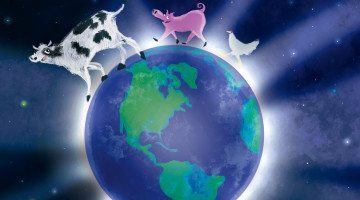by Stephanie Self
Please allow me to preface this column by saying that I know many of you may have read something like this before. However, it’s new to me, and I hope to offer some refreshing insight to the discussion.
About five weeks ago, I decided to commit to being a vegetarian. I had dabbled in it before, sometimes going a few days or weeks without eating meat in an effort to feel healthier and to “cleanse” my body, but I had never actually made it a diet I stuck to. It wasn’t until after what I now refer to as “Drunktober” that I needed to get healthier in a serious way.
Being the broke, over-worked, borderline (albeit functioning!) alcoholic college student and writer that I am, it is far too easy to resort to carbs and too much protein to fuel myself throughout the day. This is especially true because, as broke college students, eating isn’t really about enjoying a meal or getting all the nutrients in a multivitamin: it’s about not being hungry.
Along with this “let’s get healthy” attitude, I happened upon a clip from the documentary “Baraka,” in which baby chicks were shown in a factory before they were then locked into cages to be slaughtered or lay eggs or whatever their intended use. It didn’t really matter what the reason was; the point was that this is how most people living in industrialized countries get their meat. I’d seen other documentaries before that solely discuss the horrid state of our food industry, and I’ve been handed PETA pamphlets with graphic photos of slaughtered cows and chickens, but this affected me in a way that I still can’t quite articulate.
I have a hunch that it has to do with a belief I’ve had for a while, that if I couldn’t kill an animal myself, then I shouldn’t eat it. Granted, that’s not really the world we live in anymore, but it doesn’t justify the means, in my opinion. If I can’t stand to watch chickens all crowded in a cage, hanging out with their fecal matter, how could I rationalize eating them anyway? “Hey, li’l chicky, I know you had a shit life, but somebody’s gotta eat you now, so I guess it’ll be me.” Everyone has his or her reasons for the lifestyle choices he or she makes, and these were mine.
With all that said, my point here is not to simply tell you about my path that led to vegetarianism. It’s that I feel compelled to explain why I’m a vegetarian every time it comes up. More often than not, though, it feels like I’m defending myself more than explaining. It’s caused me to refrain from even mentioning that I don’t eat meat until absolutely necessary, like if someone says, “Why did you ask for the vegetarian menu?” People are always curious about my motivations for converting, but it never matters what my actual explanation is: those same people are frequently quick to assume that I’m touting some sort of vigilante-like purpose that translates to “I’m a better person than you are because I don’t eat meat.”

Being a vegetarian comes with certain stigmas, and columnist Stephanie Self is tired of explaining herself, only to be ostracized after the fact. Dietary restrictions are a choice, and those choices don’t always reflect arrogance. Photo courtesy of Joshua Self
This couldn’t be further from the truth.
I don’t think I’m better than anyone because of my diet, although I understand why people would think so. There are organizations and individuals who tout that vigilante-like purpose every chance they get. I can admire them for their dedication to trying to improve the world in a way they find valuable, but there’s danger in chastising one person’s lifestyle so that they’ll adapt to another. It’s certainly never worked on me.
Ultimately, though, everybody’s diet is his or her own choice. I am definitely of the opinion that we shouldn’t be genetically modifying our fruits and vegetables that are perfectly good the way they are. We shouldn’t be so disconnected from our food that we don’t even know where it comes from. We shouldn’t be keeping animals in unsanitary conditions if we’re going to eat them. We shouldn’t be spraying ammonia on meat to kill E. coli that shouldn’t even be there in the first place. And, for now, my diet is reflecting those beliefs.
Of course, in order for these changes to take place it would require everyone to participate, but does anyone really foresee the American population giving up meat anytime soon?
Like Michael Jackson sings, “If you want to make the world a better place, take a look at yourself and make that change.”
Stephanie Self studies English and journalism. She can be reached at self@http://archive.archive.nevadasagebrush.com.











